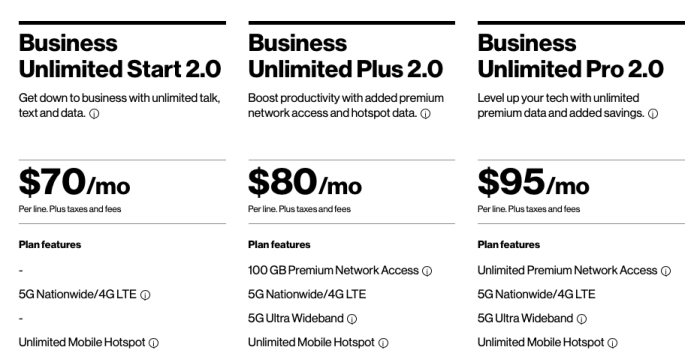Smartphone Plans Verizon: Navigating the vast landscape of Verizon’s smartphone plans can be overwhelming. From data plans and pricing to phone selection and financing, understanding the intricacies of Verizon’s offerings is crucial for finding the perfect plan to suit your needs and budget.
This guide delves into the world of Verizon smartphone plans, providing a comprehensive overview of their offerings. We’ll explore the different plan types, data options, pricing structures, phone selection, add-ons, network coverage, customer service, promotions, and a comparison to competitors. Whether you’re a new customer or looking to upgrade your existing plan, this guide will equip you with the knowledge to make informed decisions.
Comparing Verizon to Competitors
Choosing the right wireless carrier can be a daunting task, with several options available, each offering unique plans and features. Verizon is a major player in the industry, known for its extensive network coverage and reliable service. However, comparing Verizon to its competitors is essential to determine the best fit for your specific needs and budget.
Verizon vs. AT&T
Verizon and AT&T are the two largest wireless carriers in the United States, both boasting vast network coverage. While both offer a wide range of plans and features, key differences exist in pricing, data allowances, and bundled services.
Verizon’s plans generally tend to be slightly more expensive than AT&T’s, especially for higher data tiers. However, Verizon offers more generous data allowances at each price point, making it a better choice for heavy data users.
- Pricing: Verizon’s plans are generally slightly more expensive than AT&T’s, especially for higher data tiers.
- Data: Verizon offers more generous data allowances at each price point, making it a better choice for heavy data users.
- Features: Both carriers offer similar features, including mobile hotspots, international roaming, and family plans. However, Verizon’s 5G network is more widely available and offers faster speeds.
AT&T, on the other hand, often offers more competitive pricing for lower data tiers, making it a more budget-friendly option for light data users. AT&T also has a strong focus on entertainment, offering bundled services with HBO Max and other streaming platforms.
Verizon vs. T-Mobile, Smartphone plans verizon
T-Mobile has emerged as a strong competitor in recent years, known for its aggressive pricing and unlimited data plans. While Verizon’s network coverage remains wider, T-Mobile has significantly improved its network infrastructure, providing reliable service in most areas.
- Pricing: T-Mobile offers more affordable unlimited data plans compared to Verizon, making it a compelling choice for budget-conscious users.
- Data: T-Mobile’s unlimited data plans offer a significant advantage over Verizon, especially for users who consume large amounts of data.
- Features: T-Mobile offers unique features, such as its “Scam Shield” service that helps protect against spam calls and text messages. Verizon, on the other hand, has a strong focus on network reliability and customer service.
T-Mobile’s unlimited data plans are a major draw for many users, offering unlimited talk, text, and data without the worry of exceeding data limits. However, Verizon’s network coverage remains more extensive, especially in rural areas.
Verizon vs. Sprint
Sprint, now owned by T-Mobile, has been integrated into T-Mobile’s network. While Sprint’s standalone plans are no longer available, it’s still worth comparing its legacy offerings to Verizon’s plans.
- Pricing: Sprint’s legacy plans were often more affordable than Verizon’s, especially for lower data tiers.
- Data: Sprint offered unlimited data plans, but with data throttling after a certain usage limit.
- Features: Sprint offered unique features like “Sprint Free” which allowed customers to use certain apps without using data. However, these features are no longer available.
While Sprint’s legacy plans are no longer available, the comparison highlights the importance of considering different carrier offerings and their respective strengths and weaknesses.
Verizon vs. Other Carriers
In addition to the major carriers, numerous smaller regional carriers and MVNOs (Mobile Virtual Network Operators) offer wireless services. These carriers often leverage the networks of major carriers, like Verizon, but offer more competitive pricing.
- Pricing: Smaller carriers and MVNOs often offer more affordable plans, especially for basic data needs.
- Data: Data allowances may vary depending on the carrier and plan. Some MVNOs offer unlimited data plans, while others have data caps.
- Features: Features and services offered by smaller carriers and MVNOs can vary widely. Some may offer international roaming, while others may not.
Choosing a smaller carrier or MVNO can be a cost-effective option, but it’s essential to consider network coverage, data speeds, and customer service before making a decision.
Summary: Smartphone Plans Verizon
Ultimately, choosing the right Verizon smartphone plan requires careful consideration of your individual needs, usage patterns, and budget. By understanding the various options, features, and pricing structures, you can make a well-informed decision that ensures you get the best value for your money. Remember to take advantage of promotions, explore add-ons, and prioritize network coverage in your decision-making process. With a bit of research and planning, you can find a Verizon plan that seamlessly fits your lifestyle and keeps you connected.
Verizon offers a wide range of smartphone plans to suit different needs and budgets. If you’re looking for a budget-friendly option, you might consider a ZTE smartphone, like the ones you can find at zte smartphone verizon. ZTE devices are known for their affordability without sacrificing essential features, making them a great choice for those who want to stay connected without breaking the bank.
 Informatif Berita Informatif Terbaru
Informatif Berita Informatif Terbaru
